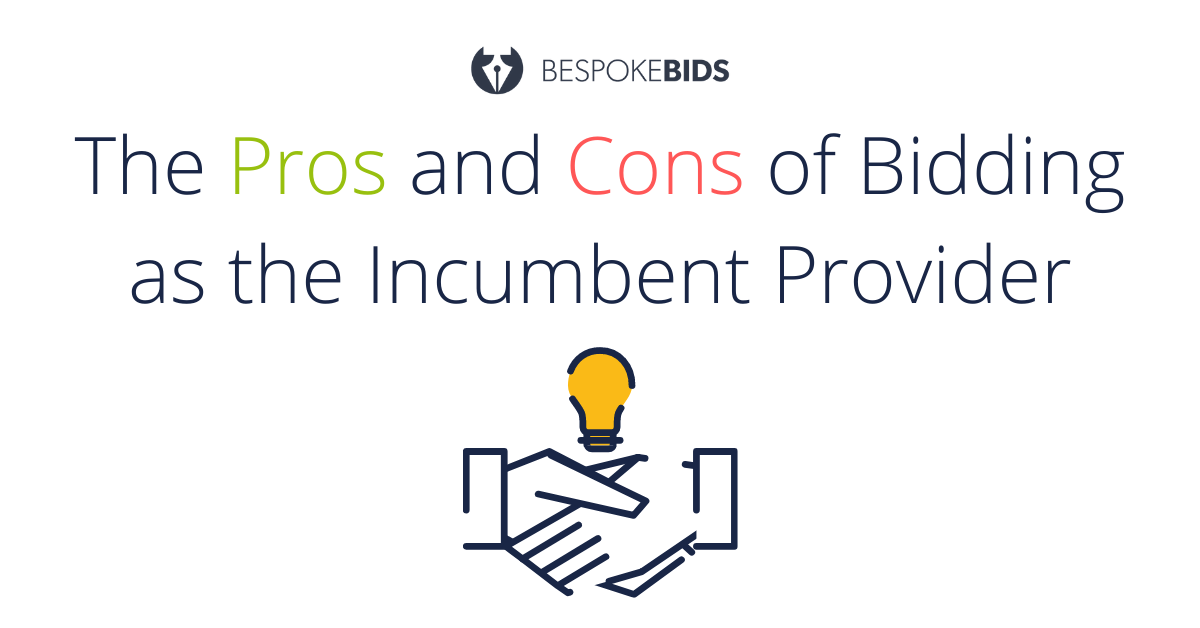
Bidding as the incumbent provider can be a confusing and daunting process. While on one hand, you may benefit from first-hand experience of the contract, you are also at risk of the buyer wanting a change in supplier.
The stakes are generally also higher for incumbent providers. If you lose the tender you will lose business. Conversely, a non-incumbent bidder might be able to continue their business as usual if they are unsuccessful.
It is therefore important when preparing your response to the tender that you weigh up the benefits your incumbency offers and mitigate against any potential negatives.
Incumbent Benefits vs Negatives
Benefits
Being the incumbent provider can have a number of benefits, but also some negatives when tendering to retain a contract. The key benefits of being the incumbent include:
No Need for Implementation
As the incumbent, your services are already in operation and you should have the appropriate infrastructure in place to continue delivering the contract. This is in stark contrast to your competitors, who may need to conduct recruitment drives, arrange client meetings and draw up implementation plans.
If you are delivering your service well, the buyer is likely to have faith in your ability to continue servicing the contract. Conversely, non-incumbent suppliers present uncertainty and doubt.
Being the incumbent also makes responding to the tender simpler in practice. Many will ask for you to provide an implementation or service delivery plan. For the former, you can simply explain that you will continue as usual with no need for implementation. For the latter, just explain what it is you already do, without needing to be hypothetical.
Service Experience
Another benefit of tendering as the incumbent is that you have an established knowledge of what the actual service involves. The description of a tender on paper and its reality may be different. As the incumbent you will be able to recognise these discrepancies and weave your unique perspective into your response.
Like any sort of interviewing or bidding process, a buyer is likely to want examples or references. As the incumbent you will be able to describe your current experience of delivering the service. Other tenders will only be able to describe their experience of delivering either a similar service or the same one to a different authority. By using the buyer as your example, they will know the extent to which you are telling the truth regarding your service delivery experience. The examples and claims of other bidders, may however, be taken with an extra pinch of salt.
Relationship with the Buying Authority
As the incumbent provider, you are likely to have developed a close working relationship with the contract management staff at the buying organisation. For the purpose of the tender and any contract, quality or performance management questions in particular, this pre-existing relationship is helpful for two main reasons:
Firstly, you should be able to confidently respond to any contract, quality and performance management question. The processes you will be expected to provide will already be in place and you will know what these arrangements are. Your rivals, however, may only be able to make proposals which do not meet the buyer’s requirements.
Secondly, the benefit of being the incumbent in this regard is if you have a good relationship with the contract management team, you can weave this throughout your response, highlighting that the buyer’s contract is already in good hands.
TUPE
TUPE, or the Transfer of Undertakings Protection of Employment regulations, ensures that if an incumbent contractor loses their contract, staff will be transferred to the new contractor. While this is great for your staff, as the outgoing incumbent, TUPE probably doesn’t provide you with any solace. However as the incumbent, TUPE questions would not apply. If you win the contract, your staff will just continue working for you as the contract has not changed providers.
This should make answering this question much easier and will also give the buyer peace of mind. This is because TUPE is a frequently misunderstood process and can be lengthy and stressful for all involved. The main reason for TUPE is to protect employment. As the incumbent, this aim would be achieved far more easily.
Pricing
Providing competitive costing is often an important element of the bidding process. As the incumbent you should have a head-start. Although your rivals can undercut you, you will have a better understanding of the true contract value. Your rivals might only know the range of values offered in the tender documents. You will also understand what your operational costs are, meaning that you can identify price cuts while still turning a profit.
Negatives
It is also important to note that being the incumbent provider may not always be positive and could, in the worst circumstances, be a hindrance.
Poor Experience
The benefits to the buyer of your having experience of service delivery assumes that this experience was positive. If, however, your service delivery has not quite been up to scratch, spinning your experience with the buyer in a positive light may be difficult.
Furthermore, the benefit about the buyer treating your account more favourably as they know it to be true is reversed. They will know exactly where you have tried to cover up the existing discrepancies in your service and will likely hold this against you.
In these circumstances, it might be best to suggest changes to your service delivery moving forward. Addressing any concerns, without explicitly acknowledging failings.
Poor Relationships
In a similar vein, having a poor relationship with the buyer could potentially scupper a bid. This might not necessarily make responding to the questions any harder, but it will likely mean that they will apply greater scrutiny when reviewing your bid and could be looking for any opportunity to disqualify you. Although they can’t do this without reason, the excuse that they use to exclude you might be increasingly petty.
It is therefore essential that you follow all of the tendering instructions to the letter, denying them the opportunity to disqualify you for a simple mistake.
Added Value and Social Value
Even if you have good relations and experiences with a buyer, a question asking you to describe added value or social value you will provide during the contract may be difficult.
‘Added value’ is a vague term, but often means that the authority is trying cut their costs. This can be problematic, as if the buyer is using your current contract as the benchmark, they may be expecting you to provide cost-cutting efficiencies on top of those you are already delivering.
You should therefore pay attention to the wording of question. If it asks you to describe efficiencies you have previously introduced, this is fine as you can describe current practises. If, however, the question asks you to describe efficiencies you will introduce, you may have to be more creative.
Describing social value can also be problematic. Again, read the question thoroughly to see what exactly it is asking.
Where a question asks you to describe your current or previous social value actions then you can explain how many local employees and apprentices you have, charity events you have supported and local SMEs you work with etc. If, however, it asks you to provide commitments for the purpose of the contract, you will have to come up with some. If you are not prepared to employ more people, you could commit to free things, such as offering work experience placements in tandem with local schools, or supporting charity events.
Tailored Tenders
Depending on your relationship with the buyer, the tender may be tailored to promote or exclude your bid.
A tender may be tailored to support your bid if:
- The questions refer to processes, policies or procedures that are bespoke to your organisation.
- The qualification requirements, such as accreditations and turnover thresholds, are identical or similar to the ones you already meet.
- Questions are recycled, or similar to your original tender for the contract and don’t ask about new or innovative procedures.
- There are very tight deadlines, reducing the time in which rival bidders can discover and bid for the contract.
- The score awarded for pricing is a small proportion of the overall evaluation.
Conversely, buyers may have designed a tender to exclude your bid if:
- You’re asked for your approach to new procedures or processes that have not been previously implemented or previously mentioned.
- It asks you to provide a number of innovative services that you offer on top of the current contract.
- The qualification requirements include elements that the buyer knows you don’t have.
- The score awarded for pricing is a higher than previously as a proportion of the evaluation criteria.
During your initial tender document review, keep these tactics in mind.
First Time Tenders
If you are the incumbent provider of a service that has previously been contracted without a tendering process, or is below the legal value threshold for tendering, examining the reason why the contract has been put out to tender in the first place will be important when planning your approach.
Buyers put out contracts to tender for a number of reasons, including:
- Dissatisfaction with your service and desire to replace you through competitive tendering.
- Cost-cutting exercise to obtain a range of offers, or coerce you into reducing your prices.
- Wanting to operate a more professional and scrutinised procurement process.
You should always examine the content of the tender in order to determine how to approach your bid. E.g. if the cost element of the tender has a high weighting, this may suggest buyer unhappiness with current pricing. If quality management is a key focus, this may suggest they feel your service is not up to scratch. Determining what the buyer wants, as the incumbent, is vital in determining how you approach your response to a bid.
Tailoring your response to play to you strengths or to address the buyer’s concerns can be a difficult task when you have the day-to-day operation of your business to contend with. If you are finding this particularly testing, perhaps consider partnering with Bespoke Bids. We have significant experience in recognising the often-nuanced signs included within tenders and can design your responses accordingly.
Did you enjoy this post?
Check out one of our other blogs: Why You Shouldn’t Be Bidding (Yet).
Follow us on Linkedin to keep up with our day-to-day operations. We post new tenders, weekly blogs, tips, tricks and more.


